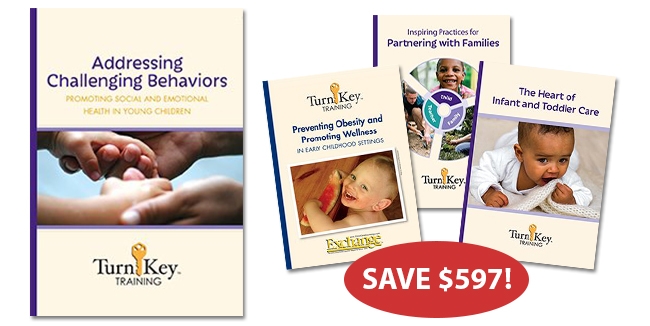ExchangeEveryDay Past Issues
 << Previous Issue
| View Past Issues | | Next Issue >>
<< Previous Issue
| View Past Issues | | Next Issue >> -Sarah Winnemucca, Northern Paiute author, activist and educator
In the 2013-14 school year 6,734 children were suspended from public pre-K programs according to an NPR report, "Why Preschool Suspensions Still Happen (And How To Stop Them). " Black children were suspended 3.6 times than white children.
Yale University's Walter Gilliam, who addressed the issue of preschool suspensions in the Turn Key Training video, "Addressing Challenging Behaviors, offers these reasons for the unacceptably high rate of suspensions for all students:
"Pay [for preschool teachers] in many cases is far less than you can get for even watching cars in a parking lot....
"It's not just about teachers earning a poverty wage. It's also about kids living in poverty and the effect that can have on their behavior. Children who live in highly stressful conditions or children who are exposed to lots of trauma — these children are going to be far more likely to be exhibiting behaviors that the teacher may not fully understand.
"Finally...most adults tend to see disruptive behaviors differently, depending on the race of the child. And we tend to hold African-American children as more culpable. And we think they're older than they are."
Gilliam points out what needs to be done about this:
"Two things...First, don't make suspension an option. Ban it in preschool. And second: Give teachers extra training and support."
Contributed by Kirsten Haugen.

|





Comments (10)
Displaying 5 of 10 Comments [ View all ]Yakima, WA, United States
I have not received my emailed newsletter since Mon. July 27th. Could there be a problem? I miss the EXCHANGE newsletter! Thanks!
Bright Horizons
Detroit, Mi, United States
I almost absolutely agree that PUBLIC preschools/pre-kindergarten programs should not be suspending children. Where I differ from that is when it is physically unsafe for either the child in question, his/her classmates or the teachers to remain in the situation. That is when public resources need to kick in. Not every child can handle a class of 16 or 20. It can literally be too much stimulation. Group care can be rough. You are locked into a schedule that may not coincide with a child's natural schedule. As teacher's, we need to recognize that and use all our tools, and built up trust that we have with each and every one of the children in our classrooms. What do we do when that is not enough? What do we do when we know, in our hearts and with all our experience, that it is not enough? If we have a "no suspension " rule, no matter what. Are we not keeping children from being successful? Are we not keeping our teachers from being successful? You can't always put a round peg in a square hole. If you do, you are basically hammering it down and splintering it to fit. Their are children, who through no fault of their own or anybody else that need a different environment. In a public ps or pk, it is up to districts, local, state and federal government to have quality places for these children.
Parkersburg, West Virginia, United States
decision and policy makers would be wise to READ Jeanne Brooks-Gunn research from 2000 compiled at Columbia university. "Do You Believe in Magic?: What We Can Expect From Early Childhood Intervention Programs"
This research produced for Congressional briefing in 2000 has been overlooked for 16 years by policy makers and educators. It can be found at file:///C:/Users/Admin/Documents/Downloads/Do_You_Believe_In_Magic____What_We_Can_Expect_Fro.pdf
Independent early childhood education consultant
Dallas, TX, United States
Using suspensions in preschool is a last ditch effort to remove a child who misbehaves. And I get it. Adults in preschools are understaffed, stressed out, and unfortunately not educated in DAP and Conflict Resolution, so then the child who needs help loses out. Changes need to occur on a national level. I'm voting for Dr. Jill Stein for President, to get someone sanity in the national debate on free early childcare and preschools.
Independent early childhood education consultant
Dallas, TX, United States
Play-based curriculums are developmentally-appropriate education for preschool. When too much teacher-directed instruction is thrown at that age, the children will act up. They are trying to escape somehow, the torture. When children are actively-engaged with an activity, with each other, with the adults in the classroom, most discipline problems disappear. Now children will have disagreements, but that's a perfect opportunity to implement Conflict Resolution, where children are taught to solve their own challenges.
Post a Comment